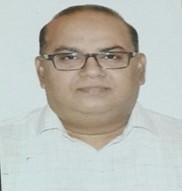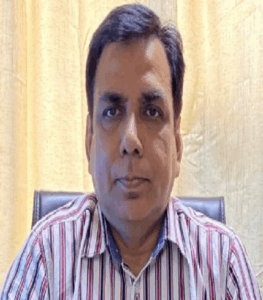Meet the authors of the winning paper
Control of spin on ferromagnetism and thermoelectric properties of K2GeMnX6 (X = Cl, Br, I) halide perovskites: emerging candidates for semiconductor spintronics and thermoelectric applications
Mudasir Younis Sofi, Mohd. Shahid Khan and M. Ajmal Khan
 |
Mudasir Younis Sofi is a Ph.D. scholar and Prime Minister’s Research Fellow (PMRF, Cycle 9) in the Department of Physics at Jamia Millia Islamia, New Delhi. He holds an M.Phil. in Physics with Rank 2 from Jiwaji University. His research focuses on perovskite-based materials for spintronic, thermoelectric, and optoelectronic applications using density functional theory (DFT). He has authored over eight first-author SCI-indexed papers, three Scopus-indexed book chapters, and presented at nearly ten international conferences, earning several Best Presentation Awards. As a Teaching Assistant at DSEU, he mentors students and advocates for sustainable electronic materials, reflecting his academic excellence and impact. |
 |
Professor Mohammad Shahid Khan is a Professor of Physics at Jamia Millia Islamia, New Delhi. He has 18 years of postgraduate teaching and 20 years of research experience and published 120+ papers in peer reviewed journals. He has supervised many PhD and Master students. His work spans nanostructured and nonlinear-optical materials, computational molecular science, photonic materials, optical spectroscopy, and clean-energy generation and storage. Beyond research, he has served university at administrative positions. |
 |
Dr. Mohammad Ajmal Khan is an Associate Professor in the Department of Physics at Jamia Millia Islamia, New Delhi. He has over 19 years of teaching and research experience. His research focuses on condensed matter, optoelectronic materials, and computational modelling of materials. He has published over 70 research papers in peer reviewed reputed journals and actively supervises Ph.D. and postgraduate students. Dr. Khan also carried out many major research projects successfully. His recent work on energy-efficient and functional materials supports advancements in nanoelectronics, thermoelectrics, and next-generation semiconductor technologies. |
What aspect of your work are you most excited about at the moment?
We are particularly excited about advancing the development of lead-free, environmentally sustainable double halide perovskites for multifunctional applications in spintronics, thermoelectrics, and energy conversion. Leveraging advanced density functional theory (DFT) and post-DFT approaches, we aim to design materials with precisely tailored properties—combining fundamental scientific insight with strong potential for real-world technological impact.
How do you feel about Materials Advances as a place to publish research on this topic?
Materials Advances is an excellent platform for publishing interdisciplinary and forward-looking materials science research. Its global reach, rigorous peer-review process, and commitment to emerging technologies make it an ideal venue for impactful work in perovskite-based materials.
Can you share one piece of career-related advice for early career scientists?
Stay curious, collaborative, and consistent. Build a strong foundation in theory, actively share your work, and seek feedback. Many opportunities emerge through openness, persistence, and genuine scientific engagement.













